
Michelle Le ’95, ’96, Vice President of International and Alumni Programs
TFAS students know firsthand the transformational benefits of our programs. Some alumni participate in multiple programs to see more of what TFAS has to offer, and some alumni are so captivated by TFAS’s impact they return as staff members. This affords them the opportunity to pass along their enthusiasm for liberty and leadership to the next generation of TFAS students. In our interview series with these individuals, we’re introducing the alumni staff members to showcase the people behind our programs. You can find the other featured interviews linked at the bottom of this page.
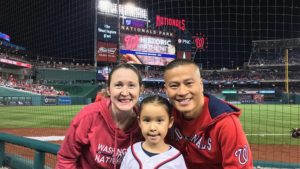
In this feature, we’ll hear from Michelle Le, a two-time alumna of TFAS programs. Her first encounter with TFAS was in the D.C. Academic Internship Programs Journalism + Communications track in 1995. She then went on to participate in TFAS Prague in 1996 and began working at TFAS in 1998. Le’s job title and responsibilities have changed over the years, but she now serves as the vice president of international and alumni programs.
TFAS: Which memory stands out to you as a key aspect of your TFAS experience?
Michelle Le: This may seem strange, but the international aspect of the D.C. summer Journalism + Communications program stood out to me the most. Even in 1995 we had so many international students. That was the first time I was exposed to so many people from so many different cultures. The American diversity was great – we had students from military academies, from Harvard, and from rural Alabama, so there was that sort of diversity, and then the international aspect of it was amazing too. I also distinctly remember the staff, who immediately took an interest in our lives. They had meetings with us and wanted to help us get where we wanted to go professionally.
TFAS: As someone who did not study journalism in college, why did you decide to do the Journalism + Communications program and how did it benefit you?
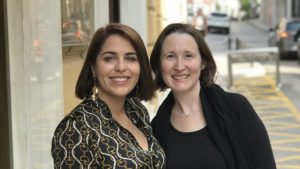
ML: Journalism was both something I was curious about and enjoyed, but it was also completely new for me. That’s what I wanted though – the opportunity to try something new. TFAS gave me the opportunity to try it out! I interned at the Military District of Washington with a military newspaper and then I worked at the National Journalism Center (NJC) after my TFAS programs. I also worked with Bob Novak, after whom our Robert Novak Journalism Fellowship is named. It was very different for me but still serves me well.
TFAS: How did your TFAS programs benefit you outside of developing your journalism and communication abilities?
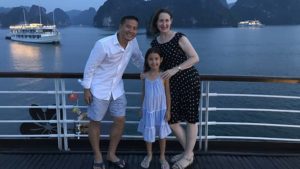
ML: My TFAS classes benefited me greatly because that was the first time I actually enjoyed economics. I had taken a couple of classes as an undergraduate student and was not interested at all. I thought of economics as a glorified math class, but my two TFAS experiences taught me what economics actually was and what it could be. The Prague experience in particular made me want to go to graduate school, specifically Johns Hopkins School of Advanced International Studies, because of the opportunity for intercultural exchange. TFAS programs are more than just a bilateral exchange – people from 20 or more countries come together and create something new. That’s what the Johns Hopkins program was like, so it was helpful to have the TFAS experience first.
TFAS: How have your responsibilities as a TFAS staff member changed over the years?
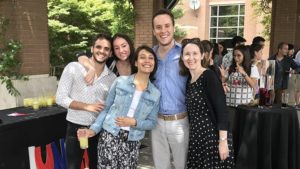
ML: I’ve had lots of different responsibilities at TFAS over the years. In 2000, I scouted various locations in Asia for a new TFAS international program. I loved it because even though I’d focused on Europe in my academic work, I translated what I had learned about interacting interculturally to this new region. It was such a blessing because I love other cultures. I love learning about other people and how they live and how their political systems are set up. For a few years, I focused on getting our Asia program set up, and then I helped a lot with our former program in Greece too. It was better than being a tourist. To be able to go and interact with people and have TFAS friends and family all across the world is simply amazing. I took several trips to South America too as we looked for partners and scouted locations. I’ve never had a chance to be bored here.
TFAS: What do you think makes TFAS unique?
ML: I think our people, especially those in leadership positions, are what make TFAS stand out. The executive leadership members, the Board of Trustees and the Board of Regents are amazing at practicing what we preach. This allows our organization to stick to its core mission: preparing the next generation of honorable and courageous leaders.
Our focus on the ideas of free societies never wavers, but the way we provide content is dynamic. Our Boards have always been open to experimenting, and that open-mindedness has allowed us to thrive.” – Michelle Le ’95, ’96
Additionally, our focus on the ideas of free societies never wavers, but the way we provide content is dynamic. Our Boards have always been open to experimenting, and that open-mindedness has allowed us to thrive. Due to this mentality, I’ve never been afraid to experiment or mess up here. Failure is going to happen, but you’re going to be left behind if you’re afraid of it. I know that we’re never going to be stuck doing things a certain way just because that’s how they’ve always been done. We’ve always had our eyes on the prize in the sense of our mission, and TFAS leadership empowers us to fulfill the mission.
TFAS: What is your biggest takeaway from your involvement in TFAS over the past 26 years?
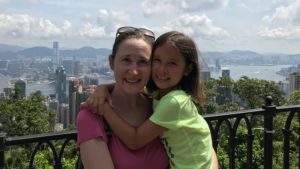
ML: I’ve learned that it’s important to embrace the ability and desire to engage with those who are culturally, religiously or philosophically different from us. It doesn’t mean wavering from our core values, but in order to really defend ideas, we have to understand where others are coming from. If you believe, as I do, that free markets and free societies are the right thing because of the moral necessity for freedom, you have to share that message from a place of respect. In my TFAS programs, it was okay to disagree with the professors and with each other as long as we did so respectfully. We as an organization have continued that to this day. We allow students the time and space to seriously engage with new ideas, to challenge them and challenge each other.
Another key takeaway is something we talk about today and something TFAS president Roger Ream ’76 always stresses: there’s a difference between hearing and listening, especially in a place like D.C. Seeing this play out as a student and then TFAS staff member, I’ve realized that we need to stop formulating arguments in our head and just listen. Give others the courtesy of listening to their ideas and where they’re coming from. That doesn’t mean we don’t challenge them, and if we still disagree that’s okay, but we have to really listen, pause, and be more thoughtful in the way we talk about our ideas. That’s my biggest takeaway.
TFAS: How have you seen TFAS professors encourage respect in the classroom?
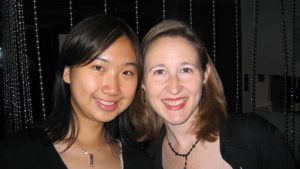
ML: I think TFAS professors are great because they engage with students from across the political spectrum, and happily so, to engage and challenge them. Giving students the time to spend together learning about each other and breaking down stereotypes is a really good thing TFAS offers. I think the important thing to realize as Americans is that it doesn’t make you un-American to disagree. We’re still in the midst of this experiment in liberty, and I think what TFAS is doing – creating and fostering courageous and honorable leaders – will help us succeed in that experiment in liberty.
TFAS: What is the most rewarding part of working for TFAS?
ML: Absolutely no question, being with the students. Hearing students’ speeches at closing ceremonies at the end of programs is unquestionably the best part. Though we hopefully all take away the same major themes, everyone experiences TFAS differently. Some people may have decided on their career path, others have gained new friends and some have had an “aha!” moment. Engaging with alumni is great too because we’re a huge global family. To see the impact TFAS has, even decades later, is amazing. It’s powerful. Some of our programs are only one week long, and yet it’s unbelievable to see years later what that week with TFAS did. When you add up everything TFAS does, it’s magic.
When you add up everything TFAS does, it’s magic.”
– Michelle Le ’95, ’96

